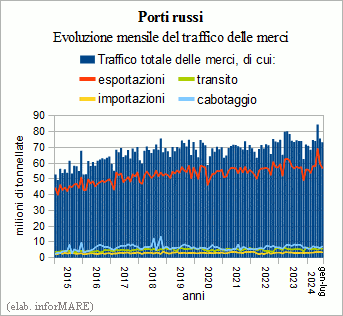
With a traffic of goods that last month was
stable result thanks to an increase in liquid bulk that
offset a decline in dry goods, Russian ports have
archived the first seven months of 2024 with total traffic
of 521.8 million tonnes of cargo, with a decrease in
3.1% compared to the same period last year. In the sector alone
of dry goods the overall figure - announced the association
of Russian commercial ports - amounted to 257.8 million
tonnes (-2.9%), of which 112.6 million tonnes of coal

(-11.4%), 42.6 million tonnes of cereals (+6.5%), 32.1 million tonnes
million tons of containerized goods (+10.8%), 25.0 million
tonnes of mineral fertilisers (+26.5%), 11.0 million tonnes of
tonnes of ferrous metals (-15.7%), 6.1 million tonnes of
minerals (+5.3%) and 4.7 million tons of rolling stock (-0.9%).
In the liquid bulk sector, the global volume was
amounted to 264.0 million tonnes (-3.4%), including 160.0 million tonnes
tonnes of crude oil (-0.9%), 77.5 million tonnes
of refined petroleum products (-9.8%), 20.6 million
tonnes of liquefied natural gas (+2.6%) and 3.7 million tonnes of
tons of food products (+7.4%).
In the first seven months of this year, the overall figure for
Export goods was 411.6 million tons
(-3.1%), that of imported goods of 24.2 million
tons (+6.1%). In addition, transit traffic was
of 40.1 million tonnes (+3.3%) and the cabotiero traffic of
46.0 million tonnes (-12.0%).
With regard to traffic in the various port regions, in the
January-July period of 2024 Russian Arctic ports
handled 55.0 million tons of goods (-4.7%), ports
Baltic Sea 162.0 million tonnes (+1.3%), the ports of the
Azov-Black Sea 162.8 million tons (-7.4%), the ports of the
Caspian basin 5.0 million tons (+15.8%) and Russian ports
of the Far East 137.0 million tons (-2.7%).